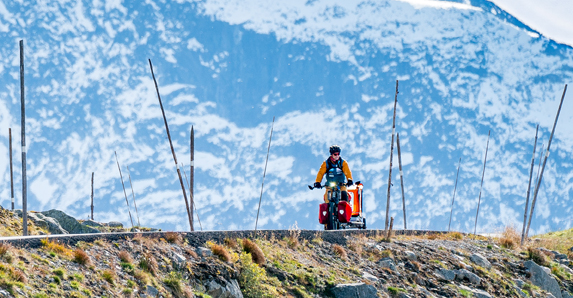
Low-flying carpet of clouds
N 55°20'27.0'' E 083°38'14.4''
Day: 112
Sunrise:
06:48
Sunset:
7:56 pm
As the crow flies:
64.65 Km
Daily kilometers:
82.58 Km
Total kilometers:
10448.45 Km
Soil condition:
Asphalt
Temperature – Day (maximum):
13 °C
Temperature – day (minimum):
8 °C
Temperature – Night:
6 °C
Latitude:
55°20’27.0”
Longitude:
083°38’14.4”
Maximum height:
276 m above sea level
Maximum depth:
205 m above sea level
Time of departure:
09.30 a.m.
Arrival time:
17.00 hrs
Average speed:
15.68 Km/h
We leave our hotel with the friendly staff and set off to cross the regional capital. As there is no bypass, we are forced to cycle all the way through this juggernaut. After 20 kilometers we are spat out unscathed by the stinking monster and find ourselves back on the arterial road towards Tomsk, the northernmost point of our trans-East journey. As usual, low-flying storm clouds block out any sunlight. It is dreary and, at eight degrees, unpleasantly cold and very damp. Shortly after the town, we stop briefly to put on warmer clothes. Due to the exertion, we sweat our clothes wet after a short time. The material can no longer wick away the moisture, which means that we immediately cool down and freeze after short stops. Once this has happened, the body is hardly able to heat up again despite the effort. At the moment we are experimenting with the order in which we wear undershirts, tiles and jackets to counteract the constant cooling. As this problem is already apparent at the current plus temperatures, we hope to survive the coming minus temperatures.
After 50 kilometers, we again take the opportunity to seek shelter from the wind and rain behind a semi-derelict petrol station. Because I’m still freezing, I put on a pair of windstopper trousers over my winter cycling shorts and put on my rain jacket so that the master can no longer harm me. “What’s it going to be like when the thermometer drops to zero degrees?” asks Tanja, shivering. “As far as I know, there is a dry cold in Siberia. It’s not as bad as wet cold,” I say thoughtfully, realizing that of course it depends on how many degrees below zero we’re talking about.
When we reach a small village after 70 kilometers, we decide to call it a day and visit a gastiniza. “Ah, I’m looking forward to a hot shower,” I say. “And me first!” says Tanja. “Is there a gastiniza here?” I ask an old gentleman sitting in his car. “Definitely in the center,” he replies. “No, we don’t have anything like that in our village,” says a woman I speak to in front of a magazine. “We have,” I am pleased to hear from a man who is just getting out of his expensive Japanese Jeep. “Wait a moment,” he says and makes enquiries for us in a nearby store. Shrugging his shoulders, he comes out and gives us the tip to cycle into the center. We pass a few people who are clearing a park area of overgrown plants in a kind of labor service. “Paris-Dakar!” shouts a woman wielding a hedge trimmer. After Tanja asks her about accommodation, she interrupts her work and walks with us to the large community building, the seat of the village government. It is comfortably warm in her office. I am allowed to sit in front of her desk while she makes several phone calls. “She’s probably looking for someone to take us in here for the night. These Siberians are very hospitable,” I think to myself. “The neat-looking woman puts the phone down and says: “Unfortunately, we don’t have any accommodation for you, but there is one in the next town.” “Hm, that’s a shame. We’re very tired. How far is the next town?” I ask, a little disappointed at having to get back on the bike. “Only 70 kilometers.” “70 kilometers? That’s a long way for a tired cyclist,” I reply. The lady who is obviously in charge of the working group outside looks at me with a smile. “Thank you for your efforts,” I say goodbye and give Tanja the unhappy news.
13 kilometers further on, we find a spot in the tall, damp grass at the edge of a sprawling birch forest. It’s raining as we pitch the tent. Everything is wet and damp. I tidy up our fabric house and hunker down in the awning to write down what I’ve experienced and upload the pictures to my laptop. Tanja is out in the drizzle boiling water for our travel lunch, which is just perfect in such nasty weather. It is still light when we crawl into our tent, take off our wet clothes and slip into the last dry clothes we still have in our Ortlieb bike bags. We immediately feel warmer. As we don’t know what the weather will be like tomorrow, I take my wet and sweaty fleece jacket with me into the sleeping bag to get it dry by the morning.

